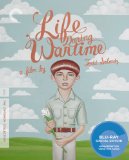| Reviews & Columns |
|
Reviews DVD TV on DVD Blu-ray 4K UHD International DVDs In Theaters Reviews by Studio Video Games Features Collector Series DVDs Easter Egg Database Interviews DVD Talk Radio Feature Articles Columns Anime Talk DVD Savant Horror DVDs The M.O.D. Squad Art House HD Talk Silent DVD
|
DVD Talk Forum |
|
|
| Resources |
|
DVD Price Search Customer Service #'s RCE Info Links |
|
Columns
|
|
|
Life During Wartime: The Criterion Collection
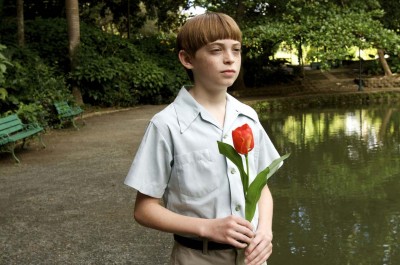
Please Note: The images used here are taken from promotional stills, not from the blu-ray.
There are undoubtedly some who feel that filmmaker Todd Solondz's (Welcome to the Dollhouse, Happiness) deliberate refusal of anything approaching victorious hope or a happy ending in his films--as well as what seems to be his inability to resist the unseemly and the brutal (rape, pedophilia, suicide, and various lesser but more ubiquitous forms of pecking-order human cruelty) when it comes to theme and content--serves only to demonstrate his misanthropy and spite for us, the audience. But to peg Solondz as nothing more than a sadist, a wallower, a fatalist, or a misanthrope would be to miss the point. He is perhaps the most morally driven/obsessed contemporary American filmmaker there is, and if he staunchly withholds comfort from his characters and us in the face of the pettiness and sordidness he sees in the world, it is only to the extent that he finds comfort to be a dangerous and already much too widely available anesthetic that only masks our real problems.
His latest sad, wry observation of the many ways we find to delude ourselves (and for Solondz that also, if not especially, means us--the literate, urbane, politically conscious art-house moviegoers who are his primary audience) is Life During Wartime, a sort-of sequel to 1998's Happiness that finds the characters from that film trying to discern some feasible code by which to live their lives in a frightening post-09/11 world. In a disorienting but effective move familiar in the past from Bunuel's That Obscure Object of Desire and more recently from Lars von Trier's Dogville and Manderlay, Todd Haynes's I'm Not There, and Solondz's own 2004 effort, Palindromes--all of which gave us the same character played by different actors--Happiness's characters are not played by the same people in Life During Wartime as they were before; Solondz has replaced them with a new (and all-around remarkable) cast. The idea is that a character, their past, and their traits have their own existence apart from the actor embodying them, which is particularly apt for Solondz's attitude toward human existence: the strength of our desire to assert our individual free will and change for the better faces a very uphill battle against our entrenched attitudes and assumptions, and we human beings are thus perhaps more interchangeable than we would like to believe.
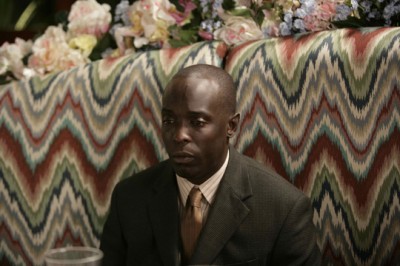
So, instead of Happiness's Cynthia Stevens as perfectionist suburban matriarch Trish, we have Allison Janney (The West Wing); as her two younger sisters, the self-consciously tortured, critically acclaimed writer Helen and the guilt-ridden, world-saving Joy, we have, respectively, Ally Sheedy (High Art) in place of Lara Flynn Boyle and Shirley Henderson (Meek's Cutoff) instead of Jane Adams. Paul Reubens plays the ghost of Andy (Jon Lovitz in Happiness), who, after his romantic rejection by Joy, killed himself, and now rather ruthlessly tears at her already bleeding heart; as if Joy didn't already have enough to contend with after having married Allen, Happiness's sociopathic obscene phone-caller, played there by Phillip Seymour Hoffman and here by The Wire's Michael Kenneth Williams. Meanwhile, Trish's ex-husband Bill (Dylan Baker in Happiness, Ciaran Hinds here) is just being released from prison after serving time for child molestation; Trish has told her children, Timmy (Dylan Riley Snyder) and Chloe (Emma Hinz) that their father is dead, and only their oldest, Billy (Chris Marquette, played as a child in Happiness by Rufus Read) knows anything about their father's crimes, or that he is still alive.
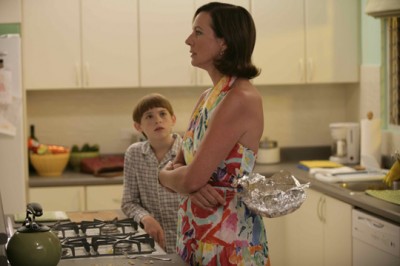
Clearly, these characters all have a past, which they understandably either want to redeem (in the case of Joy and Bill) or at least escape (Trish, Helen...really, almost everyone else). Life During Wartime picks up with Trish after she has ditched the sick Bill and moved to sunny southern Florida to be near her mother; she is being courted by a much older gentleman, Harvey Wiener (Michael Lerner), whom she hopes to marry. (Harvey and his son, Mark (Rich Pecci, who has played Mark in several of Solondz's films), are the only intact parts of the now-broken Wiener family, upon whom Welcome to the Dollhouse centered.) After it is revealed to her that Allen is still not quite able to give up on his addiction to making viciously obscene phone calls, Joy abandons him (an action that will only add to her already disproportionate burden of guilt) and runs to the arms of her family in Florida. In a similar way to that in which New Jersey has been not just a state but a state of mind in most of Solondz's previous films, the film's Florida is not "realistic" (to the extent that the actual Florida could be so described) but an idea of a paradise where you can reinvent yourself while surrounded by palm trees and pastels, washing away that troubled, unsatisfying life you might have had and person you might have been somewhere else. As usual, Solondz creates a very precise cinematic backdrop against which his characters' clashing personalities and wrenching dilemmas can play out; his films are sometimes described as "gritty" or "grimy," but they have always had quite an aware, composed, minimalist-by-design aesthetic. With the added input of the great cinematographer Ed Lachman (TheVirgin Suicides, Far from Heaven), he has furthered that under-recognized visual sense, making Life During Wartime perhaps his most visually striking film to date.
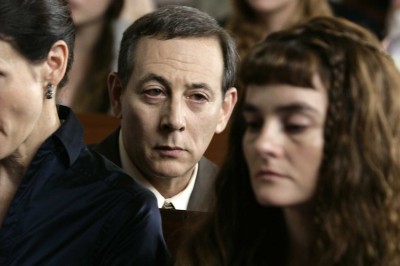
Joy takes a side trip to visit Helen, a former poet and now a successful screenwriter living in Hollywood and holding her embarrassingly ordinary family at arm's length. Tortured by what she calls "the enormity of my success," the intellectual Helen scolds the timid, downtrodden Joy for asking about her glamorous Hollywood life, exclaiming that "We're still a nation at war"; she does this against the backdrop of her backyard swimming pool and ultra-chic mansion, surrounded by servants, and we have to wonder to just what extent America's wars are disturbing Helen's sheltered existence. This is one of the film's sharpest moments, but it is done without too much emphasis, just exaggeratedly enough (Solondz's heightened-but-naturalistic style could be described as "magical mundanity") that we cringe as we witness how impotent Helen's no doubt real conscientiousness is rendered by her insularity, hypocrisy, and self-righteousness.
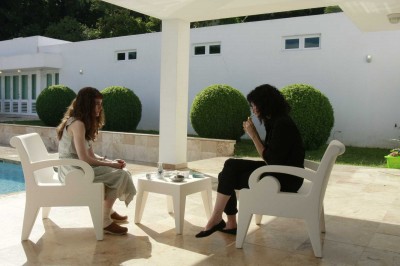
Meanwhile, Trish has to face the consequences of her ongoing deception of her children and herself when Timmy finds out, and is devastated by, the truth of what his father really was. (And still is; Bill orbits closer and closer to his former family, and there is a sickly sort of suspense that arises from the conflict between his sincere fatherly instinct to protect his children--to ensure that they remain innocent of and untainted by his unspeakable crimes--and the horrific sickness that leads him to corrupt that same innocence.) Trish and Harvey flounder in their attempts to offer answers when faced with Timmy's questions. He is about to be bar mitzvah'd, which involves pondering the philosophical dilemmas of violation and forgiveness, and the sort of confusion and inquiries this inspires in Timmy when combined with what he knows about his father and the general fears of living in the U.S. in 2011 ("Are pedophiles terrorists?" he asks, and, "Say I punched you in the face; if I said I was sorry, would you forgive me?") leave them at a loss as to what wisdom to impart to the child.
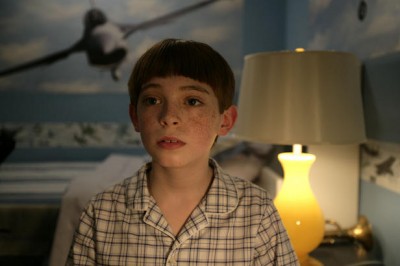
Unfortunately, that doesn't keep them from trying; their responses to Timmy's direct (as only a child could be) yet precociously perceptive, unanswerable queries are appallingly simplistic, a "common-sense" counterpart to Helen's politically more thoughtful but qualitatively identical self-righteousness. Their well-meaning but overconfident rush to mollify Timmy leads to misunderstandings that thwart the possibility of redemption or happiness for anyone, and this cuts to the heart of what Solondz is getting at: the worst thing in his universe is not being wrong or not knowing the answer, but the prideful and catastrophic inability to admit it--the cover-ups and denial we seem to reflexively engage in to evade and disguise our essential vulnerability and confusion. The very dark comedy and the almost creepily sitcom-benign/mundane suburban settings Solondz deals in are no sugarcoating applied as an afterthought and intended to make his difficult subject matter and challenging point of view easier to take or separate ourselves from; they are the native territory of the unavoidable, eternally vexing contradictions he is so intent on exposing. Solondz is moral as opposed to a moralist; he has no lessons to teach us, no sermons to preach, and despite what his critics may accuse him of, he neither condescends to nor exploits his characters. Instead, he approaches, with his inimitable combination of affection and honesty, their all-too-"normal," flawed, very recognizable reasoning and actions, with the aim of provoking us to ask ourselves the questions that do not--or, in Solondz's view, should not--have a ready answer.
THE BLU-RAY:
Lachman shot Life During Wartime on the RED digital camera, the same relatively recent innovation in DV that Steven Soderbergh used to create Che. The result is images that, in their color and composition, are unforgettable; it is not like film, exactly, but the RED has some incredibly vivid color and texture properties of its own that can only be called cinematic. Criterion's meticulous-as-always 1080p/AVC transfer, presented in Solondz's preferred 1.78:1 aspect ratio, retains that vividness in a magnificent way, allowing the home viewer to absorb and appreciate the film's visual artistry to the fullest possible extent.
Sound:The DTS-HD Master Audio soundtrack is clear and pristine, with all of the film's dialogue and music perfectly balanced and full-bodied across all channels of sound.
Extras:Ask Todd, a 45-minute audio Q&A has Solondz providing his interesting and very thoughtful, reflective answers (despite the not entirely undeserved perception of his films as being confrontational, he is no enfant terrible) to questions that Criterion elicited from fans via e-mail. The disc also features two video supplements. The first is Making "Life During Wartime", a 20-minute interview compilation that has the film's cast frankly recounting and assessing their always fulfilling but decidedly not always easy collaboration with Solondz. The other, a three-part interview with cinematographer Ed Lachman, is very informative, not only in regards to Lachman's work on Life During Wartime, but about the art of cinematography in general, with Lachman going deeply but accessibly into detail about his creative process, influences, and the different properties of digital formats vs. celluloid; whether you love, hate, or are indifferent to Life During Wartime itself, this is a must-see for anyone casually or vocationally interested in cinematography.
The accompanying, exquisitely designed booklet features an essay by critic David Sterritt and illustrations by Akiko Stehrenberger, who also designed the film's memorable poster (an image used again for the cover of this Criterion release).
FINAL THOUGHTS:With Life During Wartime, Todd Solondz continues his urgent, sometimes hilarious, often very sad exploration, through his flawed yet endearing characters and their doggedly, desperately ordinary, "normal" milieu, of the eternal philosophical and ethical questions of how best to live one's life and how one should treat others. We may laugh, but it is (or should be) a rueful laugh of recognition of our own pride and unfounded self-assurance/righteousness, no matter who we are; Solondz has a deep, tremendous compassion for his characters, however misguided and facile their attempts to eliminate their doubts and fears by exposing them to the optimistic light of lush Florida sun (captured here with a strange, incredible beauty by cinematographer Ed Lachman). Solondz is skilled at capturing the humor in our amazing ability to delude ourselves, but he takes very seriously the film's basic, vital, and very difficult-to-answer questions about loss, pain, guilt, memory, and forgiveness--perhaps more seriously than any other American filmmaker working today. And he is dedicated to bringing those questions home to us by examining contemporary American life in much the same way Fassbinder did German life in the 1970s, posing them through the struggles of ordinary, well-intentioned, but lost characters and their alarming but all-too-familiar inability or unwillingness to really examine themselves and their lives.
Certainly, part of Life During Wartime's power and indelibility comes from the fact that, while we are always entertained and engaged, we never feel comforted. That makes for a bracing experience, but the withholding of easy answers or resolutions will only make you feel attacked or victimized by Solondz's relentless moral probing if you are certain that you are, of course, already living your life as well--as morally and ethically and humanely--as possible and therefore have no need to further examine it and any shadowy corners it might have. Such an attitude leads directly, in Solondz's view, to self-righteousness and hypocrisy, and those are the afflictions that, rather than any crime or wrongdoing we might harshly and easily judge, are what Life During Wartime suggests are in most urgent need of addressing. Highly Recommended.
|
| Popular Reviews |
| Sponsored Links |
|
|
| Sponsored Links |
|
|
| Release List | Reviews | Shop | Newsletter | Forum | DVD Giveaways | Blu-Ray | Advertise |
|
Copyright 2024 DVDTalk.com All Rights Reserved. Legal Info, Privacy Policy, Terms of Use,
Manage Preferences,
Your Privacy Choices | |||||||









